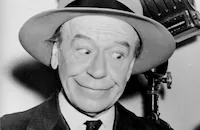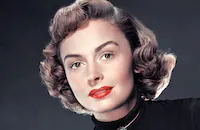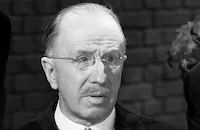Babes on Broadway

Brief Synopsis
Cast & Crew
Busby Berkeley
Mickey Rooney
Judy Garland
Fay Bainter
Virginia Weidler
Ray Mcdonald
Film Details
Technical Specs

Synopsis
In New York City, Tommy Williams, Ray Lambert and Morton "Hammy" Hammond have been performing their song and dance act, "The Three Balls of Fire," at Nick's spaghetti joint, but are let go by Nick because business is bad. Despite their impoverished condition, when Tommy finds a five dollar bill in their tip box, he seeks out the woman who put it there, thinking that she must have made a mistake. Tommy has an immediate rapport with the woman, Miss Jones, and happily keeps the money when she says that it was not a mistake. They exhange cards and Tommy offers to show her the town if she calls them at their hangout, a drugstore frequented by Broadway hopefuls. The next day, the boys get a call from the office of Thornton Reed, the biggest producer on Broadway, and find that Miss Jones is actually "Jonesy," Reed's well-known assistant. She sets up an audition for them, but warns them not to tell anyone else because Reed does not like actors. Back at the drugstore, while Hammy and Ray tell their pals about the audition, Tommy sees singer Penny Morris crying and is immediately attracted to her. After giving her encouragement, he walks her home and meets her piano teacher father and one of his students, Barbara Jo, a child who lives at the Dorman Street settlement house, where Penny works. The next day, the audition is jammed and Reed is so angry that he refuses to listen to the boys' act. The three are despondent until Tommy gets the idea of becoming their own producer. Certain that they could raise the money by enlisting a charity, because America is "cause crazy," Tommy decides to use the settlement house when he learns that the children are being deprived of their summer in the country because of a lack of funds. The settlement house's manager, Mr. Stone, approves of the idea when Tommy, Penny and the others say that they will get talent from their friends and raise money for an auditorium by throwing a block party. The rehearsals go well and enthusiasm runs high for the 4th of July block party. When they learn, however, that twenty British refugee children will be making a short-wave broadcast to their parents in London on that day, Tommy decides to use their plight as his cause, revealing to the idolizing Penny that he an opportunist. On the day of the block party, a remorseful Tommy has a change of heart, and they raise enough money to put the show on for the settlement children. When Tommy goes to see Jonesy, who was at the party, she offers him and the others parts in Reed's new show, which is having difficulties in its Philadelphia tryouts. Tommy then begs Penny to come with him, but she cannot disappoint the kids. Tommy realizes that his feelings for her will not let him fail them, and he and Penny turn down Jonesy's offer. Impressed with their good-heartedness, Jonesy allows them to use Reed's long-closed Duchess Theater for their show and promises to have Reed attend. On opening night, after arduous refurbishing and rehearsals, the show opens to a full house, but Jonesy is unable to bring Reed. Then, a city inspector arrives and closes the show because the production is violating the fire laws. A demoralized Tommy apologizes to the audience, but soon learns that no one has demanded their money back, and some have even left more so the children can go on their holiday in the country. After Barbara Jo and the others offer to give Tommy the money to put his show on again, he turns them down. Just then, Reed, who has been summoned from Philadelphia by city officials, angrily arrives and Jonesy convinces him to watch a private performance of the show. Some time later, Reed presents Babes on Broadway in a lavish production.

Director

Busby Berkeley
Cast

Mickey Rooney

Judy Garland

Fay Bainter

Virginia Weidler

Ray Mcdonald

Richard Quine

Donald Meek
Alexander Woollcott
Luis Alberni

James Gleason
Emma Dunn
Frederick Burton
Cliff Clark
William Post Jr.
Dick Baron
Will Lee

Donna Reed

Joe Yule
Tom Hanlon
Rene Austin
Roger Steele

Margaret O'brien

Bryant Washburn
Charles Wagenheim
Lester Dorr
Jack Lipson

Arthur Hoyt
Barbara Bedford
Shimen Ruskin
Anne Rooney

Dorothy Morris
Maxine Flores
Robert Bradford
Jeanie Dunn
Sidney Pepple
Douglas Wright
Sheldon Kelsey
Carl Stockdale
Six Hits And A Miss
Five Music Maids
St. Luke's Choristers
The Uptowners
Dick Davis
Stafford Quartet
Debutantes Quartet
Notables
Stop, Look And Listen
Annalee Waller
Crew
Leo Arnaud
George Bassman
Ludwig Van Beethoven
Malcolm Brown
Jack Dawn
Howard Dietz
Roger Edens
Roger Edens
Fred Finklehoffe
Fred Finklehoffe
Arthur Freed
Arthur Freed
Cedric Gibbons
E. Y. Harburg
Jararaca
Kalloch
Burton Lane
Vicente Paiva
Merrill Pye
Harold J. Rome
Elaine Ryan
William Ryan
Conrad Salinger
Douglas Shearer
Frederick Y. Smith
Bert Spurlin
Gile Steele
Georgie Stoll
Lester White
Edwin B. Willis

Photo Collections
Videos
Movie Clip


Trailer
Film Details
Technical Specs

Award Nominations
Best Song
Articles
Babes on Broadway
Producer Arthur Freed clearly wanted another Babes in Arms when he started this film. He even chose a title that mirrored the earlier films'. He enlisted Fred Finklehoffe, who had written the team's earlier Strike Up the Band, to create a new story about youngsters trying to break into show business. Then he hired Burton Lane to write music for the songs, with his brother Ralph Freed and E.Y. Harburg as lyricists for various numbers. Freed would write the score's biggest hit, "How About You," but Harburg would have the more lasting relationship with Lane, with whom he would later write the Broadway hit Finian's Rainbow. In order to introduce a wider variety of musical styles into the score, he assigned Roger Edens, Garland's longtime mentor at MGM, to arrange a lengthy minstrel sequence with such standards as "Swanee River" and "Waitin' for the Robert E. Lee." For that sequence they also bought a song Harold Rome had written for the 1938 Broadway hit Sing Out the News, "Franklin D. Roosevelt Jones." Then he asked his newest protege, Vincente Minnelli, to conceive a sequence in which Rooney and Garland visit an historic vaudeville house and re-create great moments from the theatrical past. This allowed Rooney to impersonate Sir Harry Lauder singing "She is Ma Daisy," Walter Hampden playing Cyrano de Bergerac and George M. Cohan doing "Yankee Doodle Boy." For her part, Garland would re-create Fay Templeton's performance of "Mary's a Grand Old Name," Blanche Ring singing "I've Got Rings on My Fingers" and Sarah Bernhardt's recitation of "La Marseillaise." And just to squeeze in one more number, Rooney impersonated Carmen Miranda -- complete with platform shoes, fruit-basket hat and fake breasts. As a result, this was one of the most musical of all MGM's great musicals.
Berkeley kept things hopping with his elaborate staging of the production numbers, most notably the large-scale "Hoe Down," for which co-star Ray McDonald provided assistance. He spent nine days rehearsing and another nine days shooting the minstrel finale at a cost of more than $100,000. For Garland's big solo in the number, "Franklin D. Roosevelt Jones," Berkeley planned a single shot involving 38 separate camera moves. He frightened the front office, however, when he spent an entire morning and most of the afternoon rehearsing the shot. At one point, studio head Louis B. Mayer even sent his minions to the set to see why he hadn't made a shot yet. Berkeley got rid of them in his usual way: he climbed on the camera boom and had technicians raise him so high the executives couldn't talk to him, so they just left. Then he got the entire number on the first take, releasing the company early for the day and saving the studio thousands of dollars.
Though they were playing young show business hopefuls in Babes on Broadway, Garland and Rooney were clearly growing up off-screen. During the third week of filming, Garland eloped to Las Vegas with composer David Rose. She asked for a few days off for a honeymoon, but Mayer forced her back on set the next day, disappointed that she had deprived him of the chance to garner publicity with a lavish wedding. At the same time, Rooney met the actress who would become his first wife, Ava Gardner. She had just arrived at the studio and visited the set during an introductory tour (some sources say she has an unbilled bit). Rooney was smitten at once and asked her for a date, but she turned him down, possibly because he was dressed in full Carmen Miranda drag at the time.
Like many of the "backyard musicals," Babes on Broadway was filled with talent on the rise. The partners in Rooney's dance act in the film were Ray McDonald, who would go on to star in musicals at MGM and Universal, and Richard Quine, who would become one of the most respected directors of the '50s. The young Donna Reed played one of producer James Gleason's secretaries. And in her screen debut, Margaret O'Brien turned up at an audition as an over-dramatic child actress, a prophetic comment on her later career as a tearful child star.
By the time Babes on Broadway was released in late 1941, critics were tiring of the "backyard musicals," complaining that both stars needed to take on more adult roles. But audiences loved them regardless. The film premiered two weeks after the Japanese attack on Pearl Harbor, providing audiences with an escape to more innocent times. In addition, the picture featured Garland singing the rousing "Chin Up, Cheerio, Carry On" to a group of British war orphans, which boosted ticket sales in England. Babes on Broadway made back four times its cost at the box office, spurring MGM to reunite Rooney, Garland and Berkeley for Girl Crazy (1943) later that year.
Producer: Arthur Freed
Director: Busby Berkeley
Screenplay: Fred Finklehoffe, Elaine Ryan
Based on a story by Finklehoffe
Cinematography: Lester White
Art Direction: Cedric Gibbons
Music: Georgie Stoll, Burton Lane, Roger Edens, Harold Rome
Principal Cast: Mickey Rooney (Tommy Williams), Judy Garland (Penny Morris), Fay Bainter (Miss Jones), Virginia Weidler (Barbara Jo), Ray McDonald (Ray Lambert), Richard Quine (Morton Hammond), Donald Meek (Mr. Stone), Alexander Woollcott (Woollcott), James Gleason (Thornton Reed), Donna Reed (Secretary), Joe Yule (Mason), Margaret O'Brien (Maxine).
BW-118m. Closed captioning.
by Frank Miller

Babes on Broadway
Quotes
Trivia
One of the first Hollywood musicals to acknowledge that World War II was taking place.
Notes
Noted columnist and radio personality Alexander Woollcott appeared as himself in a brief segment at the beginning of the film. The sequence is set at a broadcast of Woollcott's weekly radio program The Town Crier, in which he advises all aspiring performers to work hard and hold on to their dreams of becoming Broadway stars. The appearance marked Woollcott's first time onscreen since the 1935 film The Scoundrel (see AFI Catalog of Feature Films, 1931-40; F3.3926). According to Hollywood Reporter news items, Shirley Temple was originally cast in the role of "Barbara Jo," and Roy Del Ruth was scheduled to direct the film. The film would have marked Temple's first film at M-G-M, but instead she went into production on Kathleen (see below). News items include Jean Porter and The Peters Brothers in the cast, but their appearance in the released film has not been confirmed. The film marked the motion picture debut of child actress Margaret O'Brien, who became one of M-G-M's most popular child stars of the 1940s.
Babes on Broadway was a very successful film that capitalized on the popularity of the teaming of stars Mickey Rooney and Judy Garland, especially in such films as the 1939 Babes in Arms (see AFI Catalog of Feature Films, 1931-40; F3.0194). Babes on Broadway was one of several successful 1940s musicals which centered on a group of teenagers "putting on our own show." Several of the film's production numbers have been used in documentaries on film musicals of the 1940s, including the "Hoe Down" number and "Bombshell from Brazil/Mamá yo quiero," in which Rooney impersonated popular Twentieth Century-Fox star Carmen Miranda. In another sequence of the film, in which the characters of "Tommy" and "Peggy" think about the past stars who played the Duchess Theater, Garland and Rooney impersonate several dramatic and musical stars of the late eighteenth and early nineteenth centuries, including Richard Mansfield, Fay Templeton, Sir Harry Lauder, Blanche Ring, Sarah Bernhardt and George M. Cohan. Songs heard briefly in that sequence include "I've Got Rings on My Fingers," "Mary," "Yankee Doodle Boy" and "She Is Ma Daisy." Burton Lane and Arthur Freed were nominated for an Academy Award for their song "How About You."















